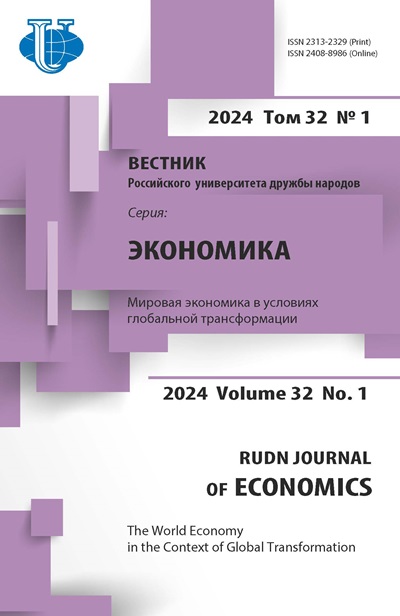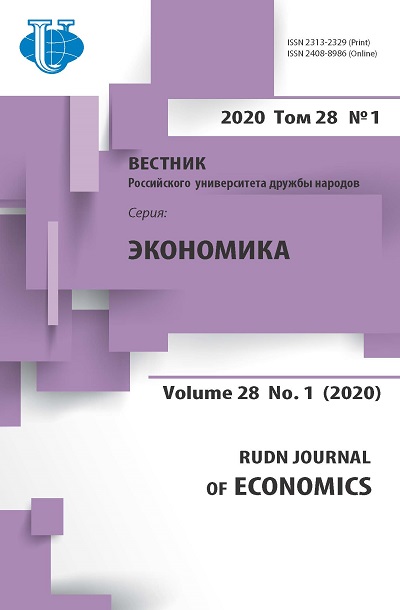The process of a national innovation system concept formulation: key problems
- Authors: Bokachev I.N.1
-
Affiliations:
- Peoples’ Friendship University of Russia (RUDN University)
- Issue: Vol 28, No 1 (2020)
- Pages: 98-109
- Section: ECONOMIC GROWTH AND SOCIO-ECONOMIC DEVELOPMENT
- URL: https://journals.rudn.ru/economics/article/view/23496
- DOI: https://doi.org/10.22363/2313-2329-2020-28-1-98-109
Cite item
Full Text
Abstract
The article discusses the process of a national innovation system (NIS) concept developing as a scientific category, which originates from the late 1980s, when the model of linear mass production was predominant. The paper notes that the linear model of production has ceased to be relevant as the economies of countries grow and develop, and innovation and qualitatively new products and R & D come first among the key factors for the success of economic development. Particular attention is paid to the features of the study of the national innovation system at the level of theoretical understanding by various scientific circles, organizations and institutions. The author also notes the process of forming a systems approach in the field of innovation. The author identifies the concepts of concepts of national innovation systems formed by such scientists as K. Freeman, R. Nelson, B. Lundvall, etc. The author has identified key issues in the history of the study of NIS, on the basis of which it is possible to identify the main contradictions in the process of studying various concepts of NIS by various scientists, and explain the missing fragments for a more accurate definition of the concept of NIS and a better understanding of how it works today. The author relates to such problems, as the ambiguity of the origin of the concept of NIS, the presence of NIS in all countries, excessive theorization and ambiguity of the interpretation of NIS in the scientific literature.
About the authors
Ivan N. Bokachev
Peoples’ Friendship University of Russia (RUDN University)
Author for correspondence.
Email: ibokachev@gmail.com
PhD student of Department of International Economic Relations of Faculty of Economics
6 Miklukho-Maklaya St., Moscow, 117198, Russian FederationReferences
- Boyer, R., & Durand, J. (1993). After Fordism. United Kingdom.
- Edquist, C. (1997). Systems of innovation: technologies, institutions and organizations. Canada.
- Edquist, C. (2005). Systems of innovation: perspectives and challenges. Oxford Handbook of Innovation (pp. 95–96). UK.
- Edquist, C., & Hoemmen, L. (2004). Comparative Framework for and Proposed Structure of the Studies of National Innovation Systems in Ten Small Countries. Sweden: Lund University.
- Fagerberg, J. (2004). Innovation: A Guide to the Literature. Norway.
- Freeman, C. (1987). Technology and Economic Performance: Lessons from Japan (p. 35). London.
- Freeman, C. (1987). Technology, Policy, and Economic Performance: Lessons from Japan (pp. 44–45). London: Pinter Publishers.
- Freeman, C. (1995). The National System of Innovation in Historical Perspective. Cambridge Journal of Economics, (19), 5–24.
- Freeman, С. (2004). Technological infrastructure and international competitiveness. Industrial and Corporate Change, 13(3), 543–544.
- Guinet, J. (2003). Drivers of Economic Growth: The Role of Innovative Clusters (pp. 150–160). Germany: Springer.
- Haas, E. (1990). When Knowledge Is Power: Three Models of Change in International. US.
- Knorr-Cetina, K. (1999). How the Sciences Make Knowledge. US.
- Leijonhufvud, А. (1981). The Wicksell Connection: Variations on a Theme (p. 46). US.
- Lundvall, B. (1992). National Innovation Systems: Towards a Theory of Innovation and Interactive Learning. London.
- Lundvall, B. (2003). Innovation System Research and Policy: Where it came from and where it might go. London.
- Malerba, F. (2002). Sectoral systems of innovation and production. Research Policy, 31(2), 247.
- Mytelka, L., & Smith, K.L. (2001). Innovation theory and innovation policy: bridging the gap (p. 22). United Kingdom.
- Nelson, R. (1993). National Innovation Systems. A Comparative Analysis. NY: Oxford University Press.















